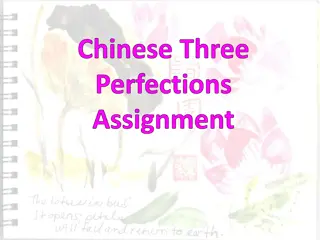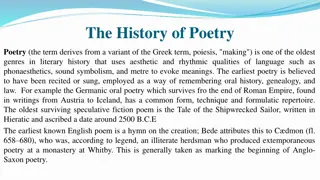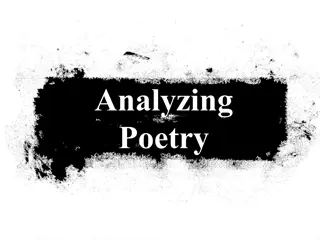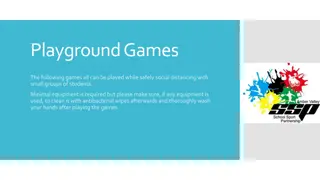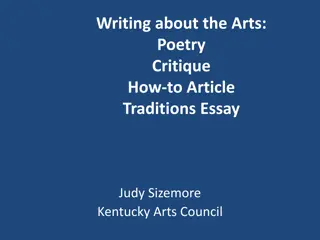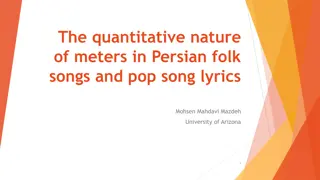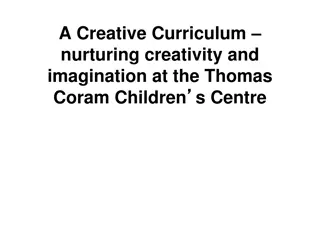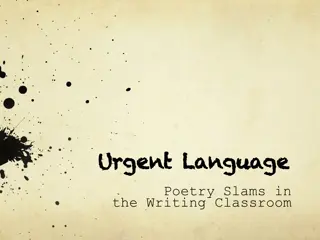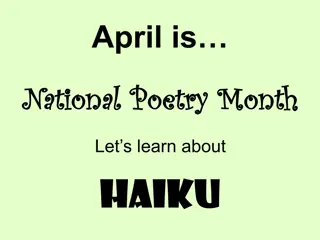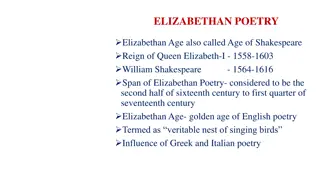Poetry Playground: A Journey Through Verses and Creativity
Delve into the enchanting world of poetry with Write Well Poetry Edition. Explore the art of crafting "I Am" poems, acrostics, and vibrant expressions. Uncover the simplicity of creating acrostics in five steps and embrace the beauty of poetic imagery. Discover poetry rules, captivating verses, and intriguing introductions that spark imaginative flights of fancy. Immerse yourself in the wonders of spring, the magic of live recitations, and the timeless allure of wordplay. Let the rhythmic cadence of poetic musings guide you through a symphony of language and emotion.
Download Presentation

Please find below an Image/Link to download the presentation.
The content on the website is provided AS IS for your information and personal use only. It may not be sold, licensed, or shared on other websites without obtaining consent from the author.If you encounter any issues during the download, it is possible that the publisher has removed the file from their server.
You are allowed to download the files provided on this website for personal or commercial use, subject to the condition that they are used lawfully. All files are the property of their respective owners.
The content on the website is provided AS IS for your information and personal use only. It may not be sold, licensed, or shared on other websites without obtaining consent from the author.
E N D
Presentation Transcript
WRITE WELL POETRY EDITION
Acrostic Poem/Poetry https://www.youtube.com/watch?v=KPAgq9bLN24 An acrostic is a poem in which the first letters of each line spell out a word or phrase. The word or phrase can be a name, a thing, or whatever you like. Usually, the first letter of each line is capitalized. This makes it easier to see the word spelled out vertically down the page. Acrostics are easy to write because they don t need to rhyme, and you don t need to worry about the rhythm of the lines. Each line can be as long or as short as you want it to be.
Creating an Acrostic in Five Easy Steps To create an acrostic, follow these five easy steps: 1. Decide what to write about. 2. Write your word down vertically. 3. Brainstorm words or phrases that describe your idea. 4. Place your brainstormed words or phrases on the lines that begin with the same letters. 5. Fill in the rest of the lines to create a poem.
Astonishing actions Batty beliefs Shocking surprises Unbelievable utterances Ridiculous riddles Daffy ducks
Singing Under the Boardwalk Makes me believe Maybe summer can last forever and Ever until I Remember I love the fall
11 Rules for Writing Good Poetry 1. Read a lot of poetry. If you want to write poetry, start by reading poetry. You can do this in a casual way by letting the words of your favorite poems wash over you without necessarily digging for deeper meaning. Or you can delve into analysis.
Spring (Again) Michael Ryan The birds were louder this morning, raucous, oblivious, tweeting their teensy bird-brains out. It scared me, until I remembered it s Spring. How do they know it? A stupid question. Thank you, birdies. I had forgotten how promise feels.
11 Rules for Writing Good Poetry 2. Listen to live poetry recitations. The experience of consuming poetry does not have to be an academic exercise. It can be musical such as when you attend a poetry slam for the first time and hear the snappy consonants of a poem out loud. Many bookstores and coffeehouses have poetry readings, and these can be both fun and instructive for aspiring poets. By listening to the sounds of good poetry, you discover the beauty of its construction the mix of stressed syllables and unstressed syllables, alliteration and assonance, a well placed internal rhyme, clever line breaks, and more. You ll never think of the art form the same way once you hear good poems read aloud. (And if you ever get the chance to hear your own poem read aloud by someone else, seize the opportunity.)
11 Rules for Writing Good Poetry 3. Start small. A short poem like a haiku or a simple rhyming poem might be more attainable than diving into a narrative epic. A simple rhyming poem can be a non- intimidating entryway to poetry writing. Don t mistake quantity for quality; a pristine seven-line free verse poem is more impressive than a sloppy, rambling epic of blank verse iambic pentameter, even though it probably took far less time to compose.
11 Rules for Writing Good Poetry 4. Don t obsess over your first line. If you don t feel you have exactly the right words to open your poem, don t give up there. Keep writing and come back to the first line when you re ready. The opening line is just one component of an overall piece of art. Don t give it more outsized importance than it needs (which is a common mistake among first time poets.
11 Rules for Writing Good Poetry 5. Embrace tools. If a thesaurus or a rhyming dictionary will help you complete a poem, use it. You d be surprised how many professional writers also make use of these tools. Just be sure you understand the true meaning of the words you insert into your poem. Some synonyms listed in a thesaurus will deviate from the meaning you wish to convey.
11 Rules for Writing Good Poetry 6. Enhance the poetic form with literary devices. Like any form of writing, poetry is enhanced by literary devices. Develop your poetry writing skills by inserting metaphor, allegory, synecdoche, metonymy, imagery, and other literary devices into your poems. This can be relatively easy in an unrhymed form like free verse and more challenging in poetic forms that have strict rules about meter and rhyme scheme.
11 Rules for Writing Good Poetry 7. Try telling a story with your poem. Many of the ideas you might express in a novel, a short story, or an essay can come out in a poem. A narrative poem like The Waste Land by T.S. Eliot can be as long as a novella. The Raven by Edgar Allan Poe expresses just as much dread and menace as some horror movies. As with all forms of English language writing, communication is the name of the game in poetry, so if you want to tell short stories in your poems, embrace that instinct.
11 Rules for Writing Good Poetry 8. Express big ideas. A lyric poem like Banish Air from Air by Emily Dickinson can express some of the same philosophical and political concepts you might articulate in an essay. Because good poetry is about precision of language, you can express a whole philosophy in very few words if you choose them carefully. Even seemingly light poetic forms like nursery rhymes or a silly rhyming limerick can communicate big, bold ideas. You just have to choose the right words.
11 Rules for Writing Good Poetry 9. Paint with words. When a poet paints with words, they use word choice to figuratively paint concrete images in a reader s mind. In the field of visual art, painting pictures of course refers to the act of representing people, objects, and scenery for viewers to behold with their own eyes. In creative writing, painting pictures also refers to producing a vivid picture of people, objects, and scenes, but the artist s medium is the written word.
11 Rules for Writing Good Poetry 10. Familiarize yourself with myriad forms of poetry. Each different form of poetry has its own requirements rhyme scheme, number of lines, meter, subject matter, and more that make them unique from other types of poems. Think of these structures as the poetic equivalent of the grammar rules that govern prose writing. Whether you re writing a haiku, a sonnet, or free verse poetry (which has no rules regarding length, meter, or rhyme scheme), it s important to thrive within the boundaries of the type of poetry you ve chosen. Even if you eventually compose all your work as one particular type of poem, versatility is still a valuable skill.
11 Rules for Writing Good Poetry 11. Connect with other poets. Poets connect with one another via poetry readings and perhaps poetry writing classes. Poets in an artistic community often read each other s work, recite their own poems aloud, and provide feedback on first drafts. Good poetry can take many forms, and through a community, you may encounter different forms that vary from the type of poem you typically write but are just as artistically inspiring. Seek out a poetry group where you can hear different types of poetry, discuss the art form, jot down new ideas, and learn from the work of your peers. A supportive community can help you brainstorm ideas, influence your state of mind as an artist, and share poetry exercises that may have helped other members of the group produce great poetry. Tips taken from: https://www.masterclass.com/articles/how-to-write- poetry
Poetic Devices At its most basic, a poetic device is a deliberate use of words, phrases, sounds, and even shapes to convey meaning. Looking to spice up your writing? Poetic devices are the salt and pepper (and, if you get really into them, the saffron and caraway) of writing; when deployed effectively, they add flavor and texture to your work. Consider your writing whether it s an essay, poem, or non-fiction article as a meal you re cooking. You use good ingredients and put a lot of care into the dish, so you know it s going to taste good. But there are ways to make it taste even better, little additions that can bring out the taste of each ingredient to make it even tastier a pinch of salt, a touch of cumin. One important thing to remember is that literary devices, like spices, are great in moderation, but overpowering if overused.
Poetic devices with practice Simile- A direct comparison between two dissimilar things; uses "like" or "as" to state the terms of the comparison. Ex: The surface of the water looked as smooth as glass. Ex: She swims like a fish. Ex: Peter laughs like a hyena. Ex: Because I was embarrassed, my face turned as red as a tomato.
Poetic devices with practice Metaphor- A comparison between two unlike things, this describes one thing as if it were something else. Does not use "like" or "as" for the comparison. It states one thing is another. Ex: The white, puffy clouds are cotton balls in the sky. Ex: My sister s mind is a camera that remembers everything she sees. Ex: Ice cream is happiness in a bowl. Ex: The moon was the tip of a fingernail tonight.
Poetic devices with practice Alliteration: Words in a poem that have the same beginning sounds. The repetition of identical consonant sounds, most often the sounds beginning words, in close proximity. Ex: Pensive poets Ex: Peter Piper picked a peck of pickled peppers Ex: Sheep should sleep in a shed Ex: A black bug bit a big, burly bear
Poetic devices with practice Rhyme- Words that have the same ending sounds. The repetition of identical concluding syllables in different words, most often at the ends of lines. Ex: June---moon Ex: flower---shower Ex: cavity---gravity---depravity
Poetic devices with practice Personification- A figure of speech in which objects are given human qualities. Attributing human characteristics to nonhuman things or abstractions. Ex: The sun played a game of peek-a-boo with the clouds. Ex: Lightning danced across the sky. Ex: The wind howled in the night. Ex: The car complained as the key was roughly turned in its ignition. Ex: Rita heard the last piece of pie calling her name.
Reactionary Poems Simply put, a reactionary poem is a poem in which you react or respond to a situation, event, image, noise, etc. Write a poem describing your reaction to one of the following images. Try to include one or more poetic devices
Praise Hands Why am I embarrassed to raise my hands in church? (Maybe embarrassed is too strong a word- inhibited?) I see other people doing in why can t I? Sometimes I put my hands palm up but keep them low and at my side does God still feel my reaching for Him see what I see? My arms extended heavenward high above my head, fingers stretching to reach His?
Homework challenge #1 Explore some poets and poems and choose one to share with the group. The more poetry you read, the more you will find your own style. Practice writing acrostic poems and select one to share with the group.
Homework challenge #2 Find an image or sound or situation that you find interesting and have a strong reaction to. Write a poem about it and try to use at least one poetic device.
Share any poems you found and any you wrote that you are comfortable sharing lying on newly mowed grass attempting to find cloud shapes but the whole sky is a cloud today I say, I see a sea but you aren t even looking up you re looking at me ( I used at least 3 poetic devices- can anyone identify them?)
Write what you know A poem can be about anything. You may think you don t know enough or lead too ordinary or dull a life, but something as simple as a wheelbarrow or washing dishes can be the subject of a poem. Many famous, published poets have written beautiful poems about mundane topics. -adapted from The Poet s Companion by Kim Addonizio and Dorianne Laux
The Thinker by William Carlos Williams My wife s new pink slippers have gay pom-poms. There is not a spot or a stain on their satin toes or their sides. All night they lie together under her bed s edge. Shivering I catch sight of them and smile, in the morning. Later I watch them descending the stair, hurrying through the doors and round the table, moving stiffly with a shake of their gay pom-poms! And I talk to them in my secret mind out of pure happiness.
The Zen of Housework by Al Zolynas I look over my own shoulder down my arms to where they disappear under water into hands inside pink rubber gloves moiling among dinner dishes. My hands lift a wine glass, holding it by the stem and under the bowl. It breaks the surface like a chalice rising from a medieval lake. Full of the grey wine of domesticity, the glass floats to the level of my eyes. Behind it, through the window above the sink, the sun, among a ceremony of sparrows and bare branches, is setting in Western America. I can see thousands of droplets of steam each a tiny spectrum rising from my goblet of grey wine. They sway, changing directions constantly like a school of playful fish, or like the sheer curtain on the window to another world. Ah, grey sacrament of the mundane! (*moiling- moving around in confusion or agitation)
Practice What do you do everyday- or on a regular basis? Write a poem about showering, or jogging, or cooking, or so on . Try, in the poem, to get at the particular way you perform this activity, that might be different from someone else.
Morning walk It rained overnight, so my morning walk glistens with dew I normally stare straight ahead and down at the street as I m clumsy and prone to tripping over a pebbles or cracks but today something catches my eye to the side and I realize a whole new city has sprung up in the grass in multiple yards some red-roofed, some like fans some brown with white polka dots I want to touch them, knock them over with my foot pluck them up and use them as doll parasols but instead, I pull out my phone take picture after picture and post them to Facebook with my status update: I love mushrooms!!!
More Poetic Devices Imagery- use of description and vivid language, deepening the reader's understanding of the work, by appealing to the senses. There are different types of imagery. These include: Visual imagery which refers to sights and allows the reader to visualise the subject, objects or events in the poem. Auditory imagery refers to sounds and reminds the reader of common or specific sounds as a point of reference to deepen understanding. Kinaesthetic imagery is related to movement and reminds the reader of body movement or positions that are familiar or imagined such as the feeling of flying. Smells and tastes can be referred to as Olfactory or Gustatory imagery respectively. Tactile imagery refers to texture and feeling.
Examples of Imagery Sound: The concert was so loud that her ears rang for days afterward. Sight: The sunset was the most gorgeous they'd ever seen; the clouds were edged with pink and gold. Smell: After eating the curry, his breath reeked of garlic. Touch: The tree bark was rough against her skin. Taste: The familiar tang of his grandmother s cranberry sauce reminded him of his youth. Touch: The tree bark was rough against her skin.
More Poetic Devices Onomatopoeia- the a word which describes its sound. Examples of onomatopoeic words include sizzle, clap, moo, roar, etc. -whoosh -bang -zip
More Practice Begin a poem with the words, I don t know You might list several things you don t know or focus on a particular thing.
Homework Make a list of the most memorable events in your life. Some of them will be large- a death, a breakup, some goal you finally accomplished. But list the small things too, things you ve always remembered as particularly special and important in some way. When you re finished, you should have a list of subjects for poems that could take you years to write. For now, start a poem about one of the events you ve listed: every so often, you can go back to the list and pick another one.






